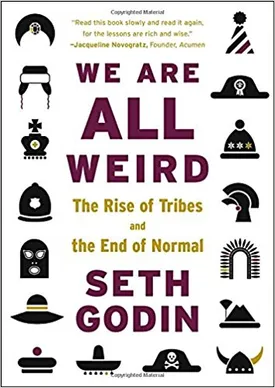We Are All Weird: The Rise of Tribes and the End of Normal by Seth Godin
The release of Seth Godin’s ‘We Are All Weird’ marks an unprecedented shift in the way businesses perceive their customers and markets. Here, Godin outlines the rise of tribes and the end of normal, presenting an argument that in order to remain competitive, businesses must become more enamoured with a broader range of potential customers and stakeholders.
Godin begins his book by highlighting the stark contrast between our authoritarian past, during which times it was not uncommon to be asked to check your individuality at the door, versus our current times which have ushered in a more tolerant attitude towards difference. While the shift has served to benefit many of those on the margins, it has also unlocked opportunities in the corporate sphere — opportunities that Godin is quick to identify.
Godin contends that with the rise of social media, today’s companies no longer have to play by the old rules, shifting their focus from mass markets and broad demographic categories to the fragmented tribes of people that are emerging on the global stage. In fact, he goes on to suggest that this shift is the only way forward for businesses that want to remain competitive in a volatile market.
Rather than marketing to the traditional demographic categories, Godin believes companies must tap into the power of tribes, offering products and services tailored to the needs and wants of their respective members. He notes that true success comes when businesses make an effort to understand each tribe and develop meaningful relationships with them. In doing so, companies are able to deliver personalized offerings that are tailor-made to meet their customers’ needs.
Godin is also particularly vocal about the need to embrace all types of customers, noting that there is no single definition of ‘normal’ — each customer is unique and businesses must be willing to accept different kinds of people. He emphasizes that companies need to ditch the homogeneous ‘one-size-fits-all’ mentality, embracing diversity and permitting all types of customers to thrive under their umbrella.
Ultimately, ‘We Are All Weird’ argues that the current market can no longer accept the status quo and businesses must be willing to make bold moves if they want to stand out from their competitors. It provides a blueprint for business owners, illustrating how they can tap into the power of tribal marketing and developing innovative products and services to meet the needs of their customers. For those companies looking to stay ahead of the game, ‘We Are All Weird’ is an essential read.

